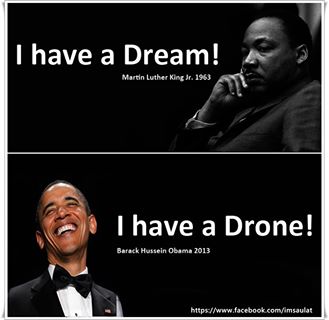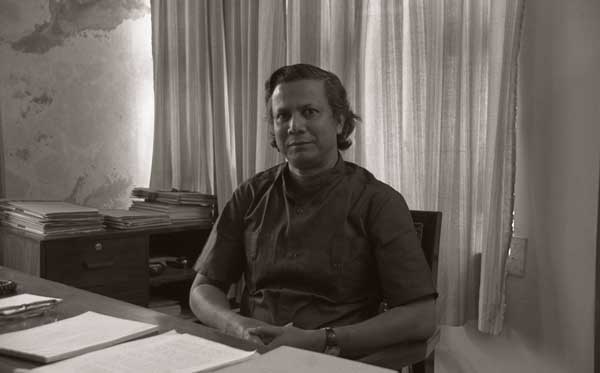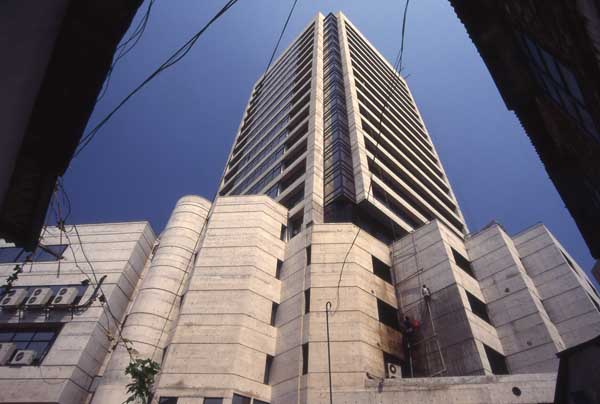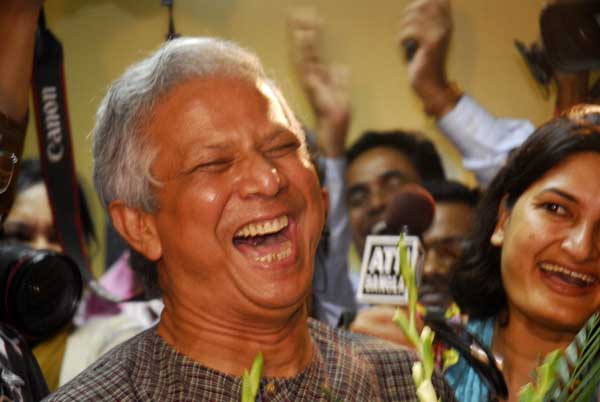By Rahnuma Ahmed
As more US troops surge into Afghanistan, as Predator drone attacks on Pakistan’s north-western villages increase, as news of operations by killing squads of US Special Forces on the Afghanistan side of the border intensifies, as yet another `front,’ a fifth one, opens up in the US-led war on terror, this time in Yemen?under the presidency of a Nobel Peace laureate?I return yet again to the day which supposedly re-wrote US history, which schematised history anew, into two distinct periods: Life Before, and Life After 9/11. How can I not? Unabated vengeance. More wars. To kill, loot and plunder….
That the prayers of those dubbed as representing the forces of `evil’ i.e., the “al Qaeda terrorists”?practitioners of a “fringe form of Islamic extremism” whose “directive commands them to kill Christians and Jews” (George Bush, September 21, 2001 )?were fulfilled on 9/11, seems to be obvious.
But the prayers of forces representing `good,’ that these too were met on 9/11, is not thought to be similarly obvious. Or, even if it is, it’s not similarly acknowledged. Not by western politicians. Nor by military leaders, defence analysts, security experts, writers, journalists?all those who speak in the name of the west. Who cling to the idea that it was a “surprise attack.” That it was carried out by “a collection of loosely affiliated terrorist organizations known as al Qaeda” who hate “our freedoms.” That it was an “act of war,” not only against the US, but against “civilization.” And that?since these terrorists number thousands and are spread in? “more than 60 countries”?America must declare war against “terror,” one which must be global, the likes of which have never ever been seen before. One that “begins with al Qaeda, but.. will not end until every terrorist group of global reach has been found, stopped and defeated.”
And thus we see newer fronts open up as the niceties of awarding Barack Obama the Nobel peace prize are endlessly talked about in polite circles, ooh, what a sweet gentle hint, ooh these Norwegians are so subtle…
Wars, however, are not subtle. As for the forces of `good,’ unlike those deemed evil, these do not? belong to the fringes. Neither of the American state, nor of western civilisation. They occupy its centre. Which is possibly why `their’ having prospered due to 9/11, is a heretical idea.
But only in the west. Outside its bounds, in the rest of the world, people talk about it. Freely.
Accounting. Before and after
In a speech to Pentagon employees on September 10, 2001, Secretary of Defense Donald Rumsfeld disclosed that over $2,000,000,000,000 (yes, twelve zeroes) in Pentagon funds could not be accounted for. “According to some estimates,” he said, “we cannot track $2.3 trillion in transactions.”
His statement didn’t make world headlines the next day. The 9-11 attacks had reduced its colossal significance to dust. As it had, the Twin Towers. But news of Pentagon’s “financial disarray” has never been headlined in western mainstream media. Strange, considering its scale, its enormity. It’d have made many third world governments?often enough unhappy recipients of lectures on good governance, elimination of corruption, accountability?ecstatically happy. May be, that’s why. It’d have undermined the west’s moral authority and of course, you can’t allow the plebs to laugh at the emperor’s nakedness.
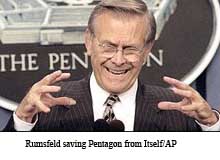
Almost $7 trillion has been adjusted in the Department of Defense’s (DOD) financial ledgers, said a report released by the inspector general of Pentagon in 2000, “to make them add up.” Of this amount, no “receipts” were available for $2.3 trillion (presumably the sum Rumsfeld mentioned) (Associated Press, 03.03.2000). An investigative report published a week before 9/11 cites an 8 page summary of the DOD’s deputy inspector general. To compile the required financial statements, it says, $4.4 trillion had to be “cooked”; of this amount $1.1 trillion couldn’t be supported by reliable information. Another $1 trillion, at the end of Bill Clinton’s last full year in office, “was simply gone and no one can be sure of when, where or to whom the money went” (Insight, 03.09.2001 Rumsfeld_Inherits_Financial_Mess[1].pdf ).
Rumsfeld had promised reforms which would help transfer billions of dollars from the “bloated” bureaucracy to the battlefield. But 9/11 happened the next day. Spurred by anthrax fears, Congress soon approved a $40 billion (this has nine zeroes) emergency measure; a year later, the national defense budget totalled $400 billion, biggest since the cold war. It didn’t include Iraq’s occupation costs, covered by a $35 billion supplemental bill. Interestingly enough, the budget was accompanied by a bill, Defence Transformation for the 21st Century, which significantly lessened congressional oversight on military spending (Guardian, 22 May 2003).
So, where did all those trillions go? In this age of euphemism, writes Kelly Patricia O’Meara, the government has its own words for “missing” money. Unsupported entries. Material-control weakness. Adjusted records. Unmatched disbursements. Abnormal balances. Unreconciled differences. Rumsfeld had his own explanation, too. It was because of “gridlock” and not “greed.” “We cannot share information from floor to floor in this building because it’s stored on dozens of technological systems that are inaccessible or incompatible.” DOD, it seems, has hundreds of computer systems which run varied accounts?health care, payroll, inventory,? ones that are not integrated.
Scoffing at what she terms the `computers don’t talk to each other’ explanation, Congresswoman Cynthia McKinney, one of the few truly people’s representative in the US legislature says, when they tell us the money was lost, what it really means is that the money went some place, but they don’t want to tell us where it went.
Business analyst Joshua Daniels adds up the figures and points his fingers elsewhere. The entire US defense budgets from 1996 to 2001, says Daniels, add up to $1.6 trillion. To reach the $2.3 trillion figure, one would have to go further behind, to 1991. Now, its not possible, he says, that the Pentagon spent hundreds of billions and didn’t get a single receipt. Or, that the Government Accountability Office (GAO) failed to notice that the entire defense budget went missing for ten years. After all, soldiers and sailors were paid, tanks and missiles were bought etc. “The missing money wasn’t on the books to begin with. It couldn’t have been; it’s more money than we gave them.” Where could it have come from then? Only the Federal Reserve, says Daniels, has such colossal sums at its disposal, and we should be asking: who hired the Pentagon to do whatever they hired it to do? What are they paying for? Who is its target?
One may not know where the missing trillions went, but that the US military-industrial complex rewards those responsible for the (mis)deed is pretty clear. Comptroller Dov Zakheim (a signatory also to the Project for a New American Century) left Pentagon in March 2004 and joined Booz Allen Hamilton ?the “most prestigious management firm in the world”(Time), which works on defense and homeland security matters?and is now vice-president there. Two former DOD officials, William J Lynn III (chief financial officer, 1997-2001) and Robert Hale (assistant secretary of the Air Force, Financial Management and Comptroller, 1994-2001) were brought back to the Pentagon by Obama, while president-elect, in January 2009, to the posts of deputy secretary of defense, and undersecretary of defense (comptroller), respectively. Hale had been working as chief lobbyist for Raytheon, a major American defense contractor.
Coincidentally, when the Pentagon was hit on 9/11, the “plane” hit an office of the Army where an investigation of the of the $2.3 trillion missing was taking place. The office lost 34 of its 45 employees, most of whom were civilian accountants, bookkeepers and budget analysts?officials who were reportedly working on the investigation. I will not go into the details of why believing the government’s account of what happened at the Pentagon on 9/11 is intellectually demeaning, but quickly quote Colonel Karen Kwiatkowski who writes, “the secretary of defense… in an unfortunate slip of the tongue referred to the aircraft that slammed into the Pentagon as a missile…”
After Christ. Atoning for the sins of others
To put the missing trillions of taxpayers money into perspective, O’Meara writes, it would have bought
(a)?? nearly 14 million accounting degrees from any four year state college, estimating the cost at $20,000 per year. Or,
(b)?? about $8 million single family houses costing $140,000 per home.
A far lesser sum, only US$22.6 billion per year, would provide access for all to improved water and sanitation services.
Another way of putting Pentagon’s missing trillions into perspective, one that I read somewhere on the internet, was: if Christ had spent a million dollars a day for two thousand years, by now he’d only have spent three-quarters of one trillion dollars.
He, of course, would have spent it differently.
